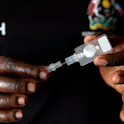
Health
30 Jan 2023
$1 smart glove could help prevent dangerous births by sensing fetal position
by Conn Hastings, science writer Image/Shutterstock.com Low-resource regions often lack the medical technology to assess when things are going wrong during birth. A new study has revealed an inexpensive sensing glove that can transmit data on fetal position and force applied to the fetal head. The technology could be invaluable in identifying obstructed birth in low-resource regions, providing real-time data on a smartphone app. Can inexpensive technologies provide a helping hand during birth? A new study in open-access journal Frontiers in Global Women’s Health has revealed a low-cost sensing glove that could do just that. The researchers created the device to assist healthcare staff in identifying fetal position and the force applied to the fetal head during labor, factors that can contribute to obstructed labor and poor birth outcomes. The technology can provide real-time data during vaginal examinations, potentially improving birth outcomes in low-resource regions. Birth outcomes in low-resource regions When labor is not going as it should, clinicians can use a wide array of medical technologies to determine what is wrong. However, in low- and middle-income countries, these technologies and skilled staff who can use them are not always available. The researchers behind this latest study reported that 98% […]













